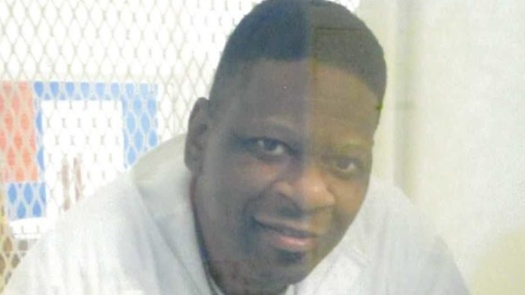Update (November 15, 2019): Rodney Reed, the 51-year-old Black man believed to be wrongfully accused of killing a white woman has finally been granted a stay of execution after countless folks championed his innocence amid new DNA evidence.
The Innocence Project reports the Texas Board of Pardons and Paroles voted unanimously in favor of indefinitely delaying Reed's execution date, which was set for November 20. The Texas Court of Criminal Appeals' announcement of the stay of execution was made soon after the Friday vote.
Reed has now been granted a 120-day reprieve which means his execution will be delayed for about four months.
Update (November 4, 2019): Rodney Reed, a 51-year-old Black man accused of killing a 19-year-old white woman in 1996, is due to be executed on November 20.
However, Reed is receiving outpouring support from many individuals and groups who believe he's innocent.
Reed's support group includes Kim Kardashian West, who recently went to Twitter to plead with Texas Governor Greg Abbott.
"How can you execute a man when since his trial, substantial evidence that would exonerate Rodney Reed has come forward and even implicates the other person of interest," Kardashian West tweeted. "I urge you to do the right thing."
PLEASE @GovAbbott How can you execute a man when since his trial, substantial evidence that would exonerate Rodney Reed has come forward and even implicates the other person of interest. I URGE YOU TO DO THE RIGHT THING.
— Kim Kardashian West (@KimKardashian) October 19, 2019
According to the Innocence Project, an organization that strives to exonerate wrongly convicted people, Reed has been on death row in Texas for the murder of Stacey Stites.
In a hard-fought battle to clear Reed's name, the Innocence Project maintains there is substantial evidence that exonerates Reed and implicates Stites’ fiancé, Jimmy Fennell, a local police officer.
The Bastrop County man is also getting support from a group of police officers, who are calling on the Supreme Court to stop the execution.
According to KVUE, 13 officers filed a brief asking the Supreme Court to consider new evidence in Reed's case.
Texas pastors also held a rally to show their support for Reed.
"No one should be executed when there is reasonable or even possible evidence of their evidence," Pastor Gaylon Clark told KVUE. "Let the evidence take us where it leads."
In a jailhouse interview with ABC News, Reed maintained his innocence.
“Early on I was somewhat upset, just for knowing her. If I wouldn’t have known her, I wouldn’t have been associated with her [and] I wouldn’t be in this situation,” Reed told ABC News’ Deborah Roberts. “But, this is the situation that was handed to me so I have [to] accept … that I did know her. I have to accept that there was a relationship. I have to accept that I’m here now for something that I didn’t do.”
Reed, who was sentenced to death by an all-white jury, told ABC News that race has been a factor in his case.
“None of them look like me but I grew up in the military. I was a military brat. I figured that they would hear the evidence and know that I’m innocent,” Reed said. “Race played a big part. I didn’t see it at first. I wasn’t seeing racism like that.”
Original (September 25, 2019): A 51-year-old Black man who was accused of killing a 19-year-old white woman in 1996 is still fighting to be exonerated.
Rodney Reed, who has been on Texas' death row since 1998 for the alleged murder, is scheduled for execution on November 20. His lawyers, however, believe there is enough evidence to clear Reed's name.
According to The Innocence Project, an organization that strives to exonerate wrongly convicted people, there is enough DNA evidence to prove Reed's case.
Lawyers for Reed have filed a petition to the U.S. Supreme Court, saying they are "challenging the Texas Court of Criminal Appeals’ unexplained rejection of critical evidence of innocence in his 1998 conviction for the murder of Stacey Stites."
The petition asks the court to look at new evidence which could confirm investigators' initial suspicion of Stites' fiancé, Jimmy Fennell. Fennell did not give a consistent account of where he was on the night Stites was murdered, Innocence Project said.
Adding to the evidence, The Innocence Project said "all of the State’s expert witnesses who supported the State’s theory that Reed raped and murdered Stites have withdrawn or modified those opinions."
According to The Economist, the main evidence against Reed in 1998 was the strands of his DNA found inside the body of Stites.
Reed said during the trial that he was having an affair with Stites and that he had sex with her the day before she was murdered, The Economist reported. Prosecutors presented Reed's semen as "the smoking gun," but Reed's lawyers argued that there should have been a closer look at Fennell.
According to Reed's complaint filed in August, Texas has consistently opposed DNA evidence which can prove Reed's innocence.
The complaint states that Stites was reported missing on the morning of April 23, 1996.
"She was alleged to have been traveling in her fiancé Jimmy Fennell's red pickup truck, which was found that morning in the Bastrop High School parking lot," the complaint states. "Immediately outside of the locked driver side door were some papers and a broken portion of Ms. Stites's leather woven belt."
A passerby reportedly found Stites' body later that day in the brush in the rural area of Bastrop County in Texas with the other half of her belt on the side of the road.
